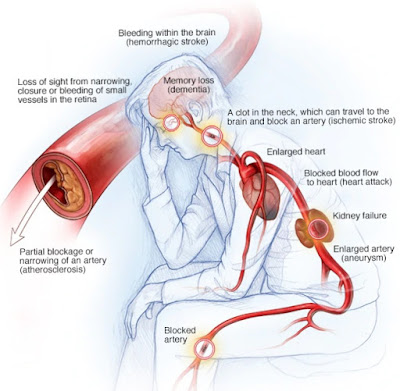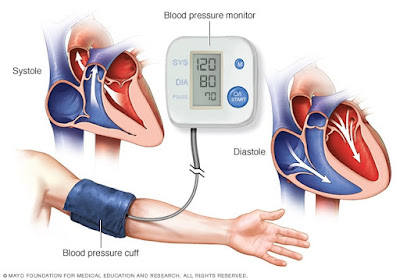What is High Blood Pressure?
What Is "Normal" Blood Pressure?
A blood pressure reading is written like this: 120/80. It's read as "120 over 80." The top number is called the systolic, and bottom number is called the diastolic. The ranges are:
• Normal: Less than 120 over 80 (120/80)
• Elevated: 120-129/less than 80
• Stage 1 high blood pressure: 130-139/80-89
• Stage 2 high blood pressure: 140 and above/90 and above
• Hypertension crisis: higher than 180/higher than 120 -- See a doctor right away
If your blood pressure is above the normal range, talk to your doctor about how to lower it.
What is the cause of high blood pressure?
Food, medicine, lifestyle, age, and genetics can cause high blood pressure. Your doctor can help you find out what might be causing yours. Common factors that can lead to high blood pressure include:
• A diet high in salt, fat, and/or cholesterol.
• Chronic conditions such as kidney and hormone problems, diabetes, and high cholesterol.
• Family history, especially if your parents or other close relatives have high blood pressure.
• Lack of physical activity.
• Older age (the older you are, the more likely you are to have high blood pressure).
• Being overweight or obese.
• Race (non-Hispanic black people are more likely to have high blood pressure than people of other races).
• Some birth control medicines and other medicines.
• Stress.
• Tobacco use or drinking too much alcohol.
What are the symptoms of hypertension?
Hypertension is generally a silent condition. Many people won’t experience any symptoms. It may take years or even decades for the condition to reach levels severe enough that symptoms become obvious. Even then, these symptoms may be attributed to other issues.
Symptoms of severe hypertension can include:
• headaches
• shortness of breath
• nosebleeds
• flushing
• dizziness
• chest pain
• visual changes
• blood in the urine
The best way to know if you have hypertension is to get regular blood pressure readings. Most doctors’ offices take a blood pressure reading at every appointment.
Treatment
Changing your lifestyle can go a long way toward controlling high blood pressure. Your doctor may recommend you make lifestyle changes including:
• Eating a heart-healthy diet with less salt
• Getting regular physical activity
• Maintaining a healthy weight or losing weight if you're overweight or obese
• Limiting the amount of alcohol you drink
But sometimes lifestyle changes aren't enough. In addition to diet and exercise, your doctor may recommend medication to lower your blood pressure.
Your blood pressure treatment goal depends on how healthy you are.
Your blood pressure treatment goal should be less than 130/80 mm Hg if:
• You're a healthy adult age 65 or older
• You're a healthy adult younger than age 65 with a 10 percent or higher risk of developing cardiovascular disease in the next 10 years
• You have chronic kidney disease, diabetes or coronary artery disease
MEDICINES FOR HIGH BLOOD PRESSURE
Most of the time, only a single drug will be used at first. Two drugs may be started if you have stage 2 high blood pressure.
Several types of medicine are used to treat high blood pressure. Your provider will decide which type of medicine is right for you. You may need to take more than one type.
Each type of blood pressure medicine listed below comes in different brand and generic names.
One or more of these blood pressure medicines are often used to treat high blood pressure:
• Diuretics are also called water pills. They help your kidneys remove some salt (sodium) from your body. As a result, your blood vessels do not have to hold as much fluid and your blood pressure goes down.
• Beta-blockers make the heart beat at a slower rate and with less force.
• Angiotensin-converting enzyme inhibitors (also called ACE inhibitors) relax your blood vessels, which lowers your blood pressure.
• Angiotensin II receptor blockers (also called ARBs) work in about the same way as angiotensin-converting enzyme inhibitors.
• Calcium channel blockers relax blood vessels by reducing calcium entering cells.
Blood pressure medicines that are not used as often include:
• Alpha-blockers help relax your blood vessels, which lowers your blood pressure.
• Centrally acting drugs signal your brain and nervous system to relax your blood vessels.
• Vasodilators signal the muscles in the walls of blood vessels to relax.
• Renin inhibitors, a newer type of medicine for treating high blood pressure, act by reducing the amount of angiotensin precursors thereby relaxing your blood vessels.
•
SIDE EFFECTS OF BLOOD PRESSURE MEDICINES
Most blood pressure medicines are easy to take, but all medicines have side effects. Most of these are mild and may go away over time.
Some common side effects of high blood pressure medicines include:
• Cough
• Diarrhea or constipation
• Dizziness or lightheadedness
• Erection problems
• Feeling nervous
• Feeling tired, weak, drowsy, or a lack of energy
• Headache
• Nausea or vomiting
• Skin rash
• Weight loss or gain without trying
Tell your provider as soon as possible if you have side effects or the side effects are causing you problems. Most of the time, making changes to the dose of medicine or when you take it can help reduce side effects.
Never change the dose or stop taking a medicine on your own. Always talk to your provider first.
One of the Most Recommended way to Lower Your Blood Pressure Naturally is By,



Tq for your time
ReplyDeleteThank you so much for the information that you have shared here with all of us. You have made it easier for us...
ReplyDeleteTop online trainer
You are very well come... Do visit this website to update yourself with new ideas and thoughts to maintain your beautiful health.
DeleteYou are very well come... Do visit this website to update yourself with new ideas and thoughts to maintain your beautiful health.
Delete